ECU students lend a hand, learn about Puerto Rico during ABE trip
Cinya Brand turned her tassel and graduated from East Carolina University with a biology degree on May 3. The next day, she boarded a flight to Puerto Rico — not to celebrate but to make a difference.
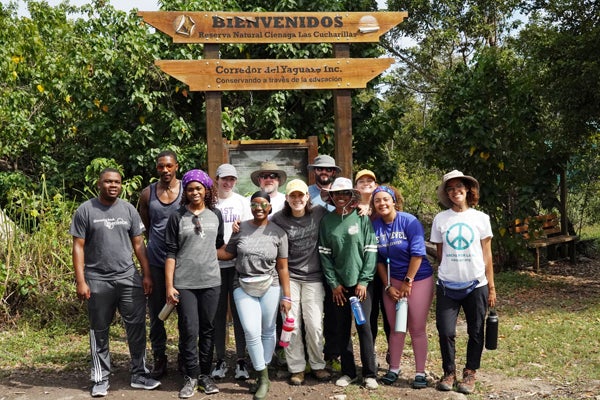
ECU students and staff pose for a picture in front of a sign for a conservation area during an Alternative Break Experience trip to Puerto Rico. Shown are, back row from left, Rodney Hairston, Katelyn Kern, Matt Rushing, Todd Fraley and Erin Mackey, and front row from left, Walter Wright, Logan Long, Miara Bonner, Madeline Tripp, Cinya Brand, Makayla Harris, and their guide, Mariela Ramirez, from the Caras con Causa organization. (Photos courtesy of Aaron Bevill, Division of Student Affairs)
Brand was one of nine ECU students and three staff members to participate in an Alternative Break Experience trip to Puerto Rico May 4-11. During the trip — organized through ECU’s Center for Leadership and Civic Engagement and also supported financially through the Honors College — the students helped restore mangrove forests that Hurricane Maria destroyed in 2017 and served with organizations that focus on community development.
“This trip was nothing short of amazing,” said Brand, who grew up in the Triad region in the city of Trinity. “In fact, I learned and enjoyed it so much that it is almost impossible to only highlight specific events. Every hour of every day was filled with adventure. I could probably write a novel … and it still would not be enough.”
Rodney Hairston, a College of Engineering and Technology senior from Henderson, said he jumped at the chance to make the journey.
“I knew going overseas as well serving others and learning a new culture for the first time was going to be an exciting experience, which it was,” Hairston said. “Coming from a very small hometown with little opportunity for volunteering, I just had to take this chance.”
With the help of Amizade and Caras con Causa on the ground in Puerto Rico, the group learned the social, historical and economical background of the U.S. territory while meeting and working with community and professional leaders.
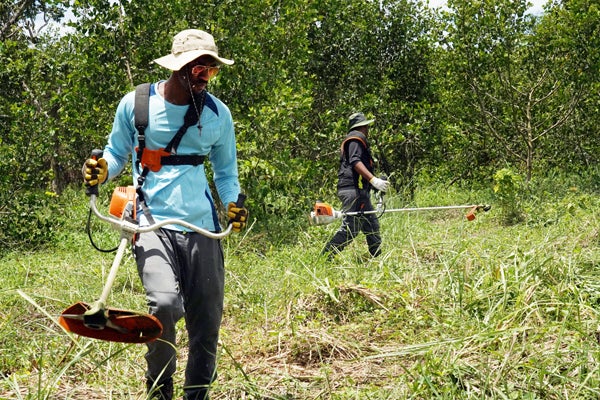
ECU students Rodney Hairston, left, and Walter Wright help clear invasive grass and weeds near a mangrove forest during the trip.
“What I enjoyed most about this trip was the opportunity to really get immersed in a totally different culture and see and hear the cultural, political and social things happening in Puerto Rico, which really helped me brainstorm and think of things I could be doing for others,” Hairston said.
Hurricane Maria devastated Puerto Rico with 155 mph winds on Sept. 20, 2017, and recovery efforts continue nearly 21 months after the storm hit the island. Restoration of mangrove forests along the coast is among those efforts.
“I don’t think we could have picked a mangrove out of a lineup,” said Aaron Bevill, video brand manager for the Division of Student Affairs. “But, we learned how the mangroves’ root system breaks up the wave action along the coast and prevents erosion, how it purifies the water, how it’s habitat for fish and other aquatic life. Mangroves absorb more carbon dioxide and release more oxygen than most other plants. It’s one of our best defenses against climate change.
“It gave the students an understanding and the reasons behind the work. When they were out there swinging machetes, they understood the benefits to the citizens.”
Still, the trip was more than just hurricane relief projects. The students also helped set up, clean and paint a school vital to its community.
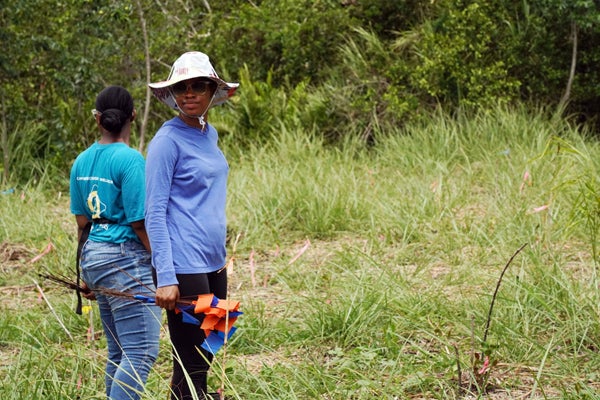
Miara Bonner, left, and Cinya Brand do some prep work at a mangrove planting area during their Alternative Break Experience trip to Puerto Rico.
“It was more than Hurricane Maria relief, but it was history and an understanding of the current situation and the current economics,” said Dr. Todd Fraley, director of the EC Scholars program and associate dean for academic programs at the Honors College. “It was a focus on what citizens are doing to reclaim their communities.
“Maria ripped the Band-Aid off other issues. We went in thinking of doing Maria relief, but there was other work that aided in other areas. There was destruction and poverty and poor infrastructure, but we saw an amazing sense of community. It was a very community-organized effort.”
Each night of the trip, the students gathered for reflective sessions during which they talked about what they had seen and done during the day.
“They asked questions that five days earlier they never would have thought of,” Fraley said.
Bevill said the students showed their dedication throughout the trip.
“They had a willingness to open their minds and a desire to understand,” he said. “They had questions, and they wanted to learn. It was very exciting to see.”
Fraley said the students took the trip as individuals but came to an understanding about what they could accomplish together.
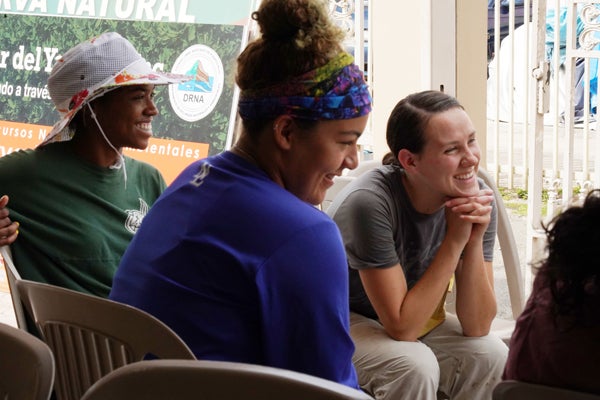
From left, Cinya Brand, Makayla Harris and Madeline Tripp listen during a presentation on their ABE trip to Puerto Rico.
“We had students from across campus. We had one pre-med and another in geology and one in the supply and logistics chain, and they didn’t see how that can overlap, but they saw that overlap down there, that they are part of a team that can make a difference,” Fraley said. “They see what they can do in their communities as a team.”
Brand said she enjoyed the trip because the group generally avoided tourist sites in favor of more local interaction that she said taught her about the “social and economic issues that impact the livelihood of the people.”
“I feel like I was provided with the most authentic experience possible,” Brand said.
Hairston said the trip encouraged him to do more.
“I really enjoyed this experience, and I feel liked it help move me more as an individual to do and seek new paths for my life,” he said. “I also feel like learning about new cultures is important, and more organizations should look into planning overseas volunteer trips. You would be surprised at how much you can learn and do volunteering overseas as opposed to taking an overseas vacation.”
Along with Brand and Hairston, other students who went on the trip included Makayla Harris, Logan Long, Erin Mackey, Katelyn Kern, Miara Bonner, Madeline Tripp and Walter Wright. Matt Rushing joined Bevill and Fraley as staff on the trip.
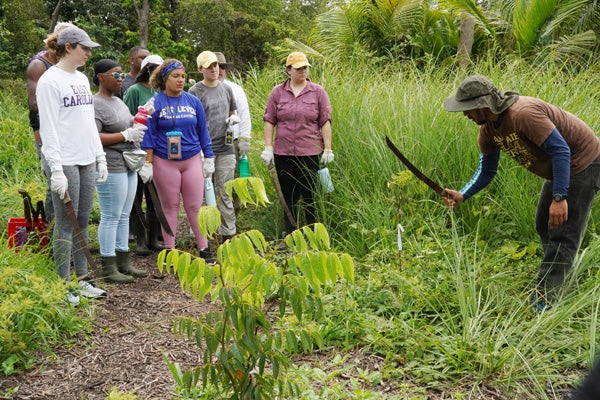
ECU students and staff on an Alternative Break Experience trip to Puerto Rico are shown proper machete techniques before starting a mangrove restoration project.
ECU Alternative Break Experiences (ABE) are designed to be learning opportunities that immerse students and staff in diverse environments that address social, economic, political, environmental, spiritual and cultural issues through the exchange of ideas, personal reflection, critical thinking and applications of academic concepts beyond the classroom. The goal is to challenge participants to critically reflect upon their roles and abilities to make lasting social change in our local, regional, and global community.
Students can learn more about future ABE programs at https://abe.ecu.edu/.
-by Ken Buday, University Communications